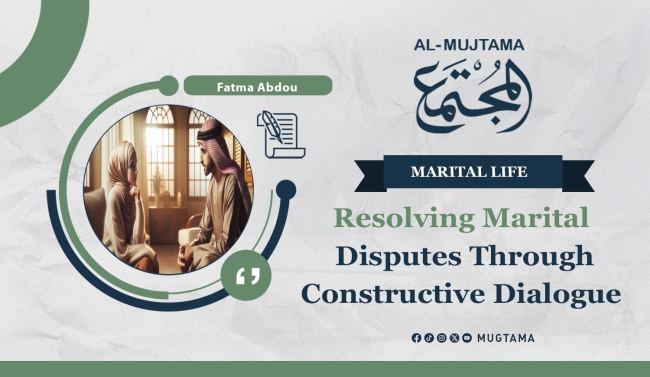Resolving Marital Disputes Through Constructive Dialogue
The family, as the fundamental unit of the Muslim community, draws its strength from the marital relationship, which Islam has established on firm principles. Within this strong bond, generations are raised and nurtured on values and good morals. Constructive dialogue is the effective tool for maintaining this relationship, as it allows couples to overcome any disagreements that may arise and strengthens the bonds of love and understanding.
In Islam, dialogue is not merely conversations; it is an elevated art that involves sharing thoughts and opinions positively and constructively to reach mutually satisfying solutions. Islam has repeatedly emphasized the importance of dialogue, advocating for tolerance, understanding, cooperation, and mutual support.
In the context of marital relationships, constructive dialogue opens a window to a world of love and understanding. It helps to strengthen the bonds of affection and mercy between spouses, as mentioned in Allah's words: “And of His signs is that He created for you from yourselves mates that you may find tranquility in them, and He placed between you affection and mercy.” (Ar-Rum: 21) Dialogue also enhances their sense of security and stability, helps resolve marital issues, and prevents them from escalating into deeper conflicts.
Marital Conflicts: The Essence of Challenges
Undoubtedly, marital conflicts are an inseparable part of shared life between spouses. They are natural in the context of human relationships between two individuals with different temperaments and experiences. However, when these conflicts become frequent or intense, they threaten the stability of the relationship and open the doors to tension and estrangement.
Sociologists, particularly those specializing in family sociology, believe that one of the main causes of marital conflicts is the lack of trust. Continuous feelings of doubt lead to interpreting simple situations negatively, planting seeds of anxiety and mistrust, which over time develop into false accusations that harm the bonds of affection and undermine the marital relationship.
Neglecting rights and duties also creates an emotional gap between spouses. One partner might fail to meet the needs of the other, whether material or emotional, causing feelings of anger and resentment. Matters can even become more complicated when family members interfere in the couple's affairs, even with good intentions. This undermines the privacy and independence of the relationship, turning family discussions into a battlefield for escalating conflicts rather than resolving them.
Analyzing the psychological dynamics and interactions between spouses, social psychologists indicate that the monotonous routine of daily life can dull the sparkle of the marital relationship. Repeated activities without renewal lead to boredom and monotony. Additionally, financial pressures are among the heaviest burdens on couples, where personal ambitions clash with the difficulties of reality, making economic challenges a fertile ground for continuous conflicts.
Constructive Dialogue: The Best Way to Resolve Marital Conflicts
Amidst these challenges, marital conflicts are not necessarily a sign of a failed relationship. Rather, they are an opportunity to clarify viewpoints and enhance communication. Through constructive dialogue, based on wisdom and patience, conflicts can be turned into steps towards closeness.
Sharp words and hurtful phrases leave long-lasting impacts on the marital relationship, even after the conflict ends. Therefore, spouses must be careful in choosing their words and avoid harsh actions that may cause permanent emotional wounds. Silence about the conflict might be a temporary solution, but it does not solve the problem fundamentally. Instead, it can lead to the accumulation of negative feelings and psychological pressures.
Hence, constructive dialogue is the best way to resolve marital conflicts. It should be based on mutual respect and the ability to listen to the other. The Prophet Muhammad (peace be upon him) said: “The best of you is the best among you in conduct.” (Sahih Al-Bukhari), guiding us to the importance of good manners in dealing with one's spouse. The goal of dialogue should be understanding and reaching a solution that satisfies both parties, not winning over the other or proving oneself right.
In addressing marital conflicts, an effective solution first requires understanding and clearly identifying the conflict. Often, disputes arise from misunderstandings, so each party should strive to express their feelings accurately, avoiding misinterpretation. Then, each individual should self-reflect and assess their shortcomings towards their partner, fostering mutual recognition of faults and paving the way for deeper understanding.
It's also essential to confine the conflict to the current issue without bringing up past problems that could complicate the situation. Dialogue should be directed with the intent of reconciliation, with a readiness to listen and understand the other's perspective. Acknowledging mistakes and offering apologies are crucial steps towards resolution and do not signify conceding one's rights but rather demonstrate maturity and awareness of the consequences.
Furthermore, showing mutual appreciation and starting the dialogue with positive affirmations can strengthen emotional bonds. Deliberation before making decisions helps couples avoid hasty choices, and adapting to personal differences and living with natural instincts, such as jealousy or differing opinions, is key to success in any relationship.
Finally, patience and perseverance are essential for both partners. Solutions may not come immediately, but understanding accumulates over time. They should both firmly believe that accepting Allah's will enhances psychological and emotional stability, making marital life more harmonious and joyful.
In summary, constructive dialogue is a refined art that transcends mere exchange of ideas. It is a shared journey towards mutual understanding, where spouses build bridges of trust and respect. Through this dialogue, they learn how to express their feelings and needs, listen to the other's viewpoint with goodwill, and strengthen the marital bond, making it more solid and stable.
-------------------------------------------------------------


